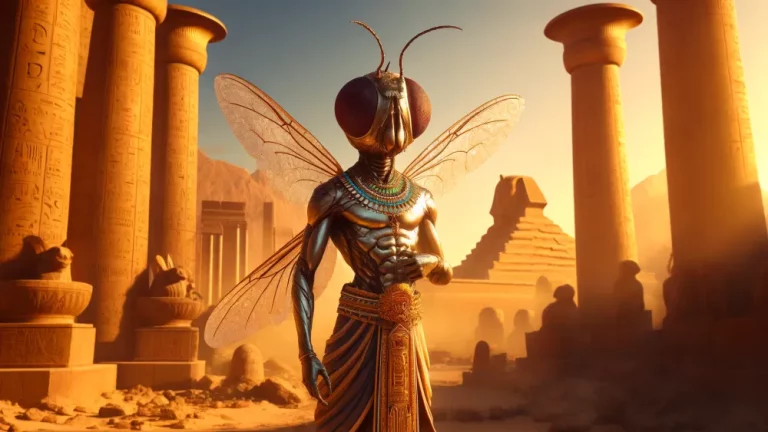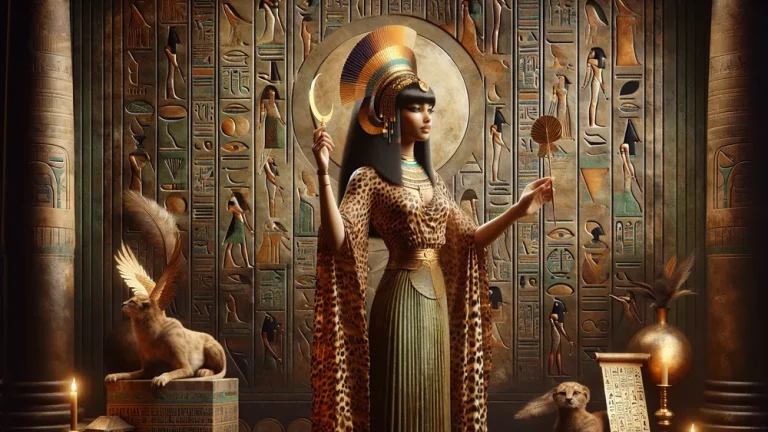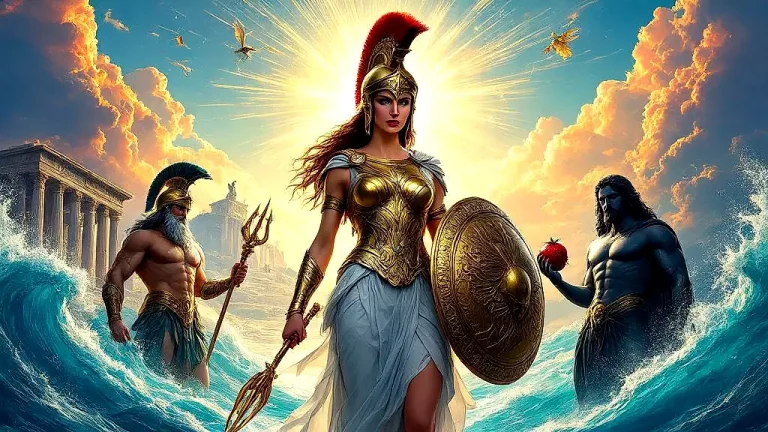Eusebeia: The Greek Spirit Of Piety And Religious Devotion
In the colorful blanket of Greek stories, Eusebeia is a big symbol of being good and loving the gods, just like the respect you might see in today’s religious or cultural traditions. You might think of Eusebeia as the spirit that guides ancient Greeks to love their gods, keep family traditions, and follow social rules, a lot like modern societies value respect and duty.
Key Points:
- Eusebeia is the spirit of being good, loving gods, and respecting social rules in ancient Greece.
- It meant a lot in Greek life, guiding prayers, family respect, and community duties.
- In Greek stories, Eusebeia appears in tales like Homer’s epics, showing respect and duty.
- It affected how Greeks lived, pushing them to respect gods, family, and community.
- Eusebeia had a role in Greek art and celebrations, showing devotion and respect.
- Other Greek spirits like Dike and Aidos had different moral meanings.
- Eusebeia is like modern ideas of piety and duty in various cultures.
This means, while looking deeper into Eusebeia, you see how this spirit was not just a myth but a part of daily life in old Greece everybody knew. In the books from then and as part of Greek rituals and social structures, Eusebeia looked as important and respected.
This section means to help you see the many roles of Eusebeia, beginning the way to know its meaning and effect on Greek culture and beyond.
Eusebeia: Overview and Key Facts
| Key Aspect | Description |
|---|---|
| Definition | Eusebeia is the Greek spirit, meaning piety and being devoted, as a sign of respect to gods and as people follow family and society duties. |
| Cultural Significance | Central to Greeks, Eusebeia helps guide prayer habits, family life, and duties in the city, making sure everyone seems to get along better. |
| Depiction in Literature | Eusebeia in classical books, like those by Homer, is about respect and duty characters must show. These stories illustrate the importance of Eusebeia among its figures. |
| Role in Greek Mythology | Eusebeia as an example of piety, we see in myths and stories, seems to guide actions, leading characters toward good choices and acts. |
| Influence on Greek Society | Eusebeia shapes daily Greek living. It points out how people must honor the gods, look after their family honor, and do their public jobs. |
| Representation in Art | Eusebeia is presented in different Greek artwork, such as in statues or pottery, meaning the virtues of respect and devotion, without any doubt. |
Getting to Know Eusebeia in Greek Mythology
When we learn more about the main part of Eusebeia, we get to see the importance it had in Greek mythology, plus how it affected what people did and the stories they told long ago.
What Eusebeia Meant to Ancient Greeks
In ancient Greek life, Eusebeia was more than just a myth. It was a big symbol of being religious and doing what gods wanted as well as following what society expected. You could think of Eusebeia like something that helped guide actions, much like how a moral compass might today make people act rightly and respect others.
For the Greeks, Eusebeia’s moral traits meant a lot, affecting how they talked to gods and got along with each other. And it touched every part of life, from religious parts like ceremonies to daily actions, making sure everyone got along and kept gods happy, which was very important to them.
To really understand Eusebeia, look at some key things important to their society, such as:

- Honor towards gods: Eusebeia pushed Greeks to respect their gods through prayer, gifts, and sacrificing, hoping to keep gods happy and help them.
- Family respect: It meant family was important, making sure everyone in a house stayed close and worked together.
- Following social rules: Eusebeia led people to obey law and customs of their city, helping keep things calm and orderly.
By meaning these ideas, Eusebeia was central to how Greeks lived, affecting their moral thinking and what rules they followed daily.
Eusebeia was a guiding force in ancient Greek life, shaping religious devotion, family bonds, and social order.
Eusebeia in Greek Stories and Legends
In the world of Greek stories, Eusebeia seems like a vital thing that means and helps characters through complex tales of myth and legend. Homer’s epics, like the “Iliad” and “Odyssey,” give us deep thoughts about how Eusebeia affects what characters do and decide. For instance, in the “Iliad,” Hector shows Eusebeia when he stays loyal to family and duty, even knowing his end is close.
He does things because he respects the gods a lot, which means Eusebeia is very important in culture to keep honor and do your role properly. Odysseus, similarly in the “Odyssey,” finds his travels filled with times where Eusebeia affects how he meets divine beings, stressing the need for respect and following what gods want.

Moreover, besides Homer’s work, Eusebeia is present in many myths and stories, where it plays an essential part in how stories and characters develop. Think about Orestes’ story, torn between avenging his dad and sticking to the moral and religious codes by Eusebeia. This conflict makes clear how the spirit affects stories, as characters wrestle with the demands of respect and family duty.
Eusebeia acts like a moral guide, making characters do things in line with what gods expect and society’s rules. Through these tales, Eusebeia is not just there but pushes characters toward becoming better and finding answers, showing its lasting importance in Greek myth.
How Eusebeia Shaped Greek Living
Eusebeia was a main part of Greek life, deeply affecting religious habits by making people feel they had duties and respect for the gods. This spirit of piety was something people could see in the careful following of rituals and important ceremonies, which were very key to keeping gods happy and making the community do well.
Imagine Eusebeia connected parts of religious life kind of like how certain customs now join groups with shared beliefs. The Greeks thought honoring gods with Eusebeia was important for personal good and their society, and this was a part of everything they did in religious activities. Regarding family dynamics, Eusebeia played a significant role to help create respect and loyalty among family members.
It made doing family jobs and keeping the peace at home important. Think of it like how families today might make sure to spend time together or support each other when it’s hard. The families in ancient Greece used Eusebeia to keep family honor and work together. Plus, this feeling went beyond just the family now to even include ancestors, keeping family bonds strong over time.
Eusebeia also greatly mattered in civic duties, affecting how people worked in their city-states. It encouraged people to join in civic stuff, doing what they should for the community and state. This sense of duty is like today’s idea of citizenship, where people need to help their society. Eusebeia worked differently in different city-states, as can be seen in this table:

| City-State | Effect of Eusebeia |
|---|---|
| Athens | Emphasized learning and culture, where Eusebeia led to public work. |
| Sparta | Focused on army discipline and being strong together, where Eusebeia made sure people were loyal to the state and joined as a group. |
Through these parts of society, Eusebeia was not merely an idea but a real guide that affected daily lives, making sure actions fit with values like duty and piety.
Eusebeia and Other Greek Spirits
Continuing our look into, let’s dig into how Eusebeia is similar to and different from other Greek spirits of goodness, each has its own way in the stories of Greek myths.
Seeing Eusebeia Next to Other Spirits of Virtue
In the collection of Greek stories, Eusebeia is with other spirits of virtue, each representing different moral ideas. Dike, the spirit of fairness, means keeping social rules right, kind of like how today’s legal systems try to make sure justice works in society. While Eusebeia focuses on piety and religious acts, Dike balances right and wrong, making sure that justice happens.

Aidos in similar ways means humility, acting as a guide in thinking about respect for society’s rules. Imagine Aidos like an inner voice asking about the results of actions, like a person’s conscience does now.
Eusebeia’s Impact on Greek Rituals and Celebrations
Eusebeia had a key role in how Greek religious rituals and festivals took shape. It was like the spiritual main part that made sure these events had deep respect and devotion. For instance, Eusebeia was a guiding idea, being in every ceremony with a sense of sacred duty. Imagine modern holiday traditions with their themes of gratitude and thinking.
Back in ancient Greece, events like the Panathenaea in Athens or the Hyacinthia in Sparta were more than just parties. These were strong acts of piety and group worship. Notably, they were carefully planned to honor the gods, and Eusebeia made sure participants followed the needed rituals, helping the community stay peaceful and get blessings from the gods.

The spirit of Eusebeia could be seen in how everyone joined in, celebrating shared values and beliefs, helping keep the group united and connected.
Eusebeia in Greek Art and Imagery
In the area of old Greek art and pictures, Eusebeia was shown through symbols that meant her core as the spirit of piety and devotion. In sculptures and pots, there often were figures in acts of worship or deep respect, which stood for the ideas of Eusebeia by how they stood and looked. Think of these pictures like modern-day examples of religious icons that mean to inspire and remind people of spiritual values.
Artistic expressions seen in temple decorations included pictures that praised Eusebeia, with parts about offerings and sacrifices, making the relationship with the gods important. These expressions, as reminders seen visually, also strengthened the cultural and religious values central in Greek society, making certain that devotion was always around in public and private places.

In ancient Greek art, symbols and pictures consistently represented Eusebeia’s spirit of piety, devotion, and the important connection with the gods, ensuring these values were visible and reinforced in both public and private spaces.
Pantheon of Greek Spirits and Daimones
The group of Greek spirits and daimones is an interesting part of Greek myths, and it includes a wide range of beings that mean different virtues, weaknesses, and natural things. Among these spirits are examples like Eusebeia, Dike, and Aidos, and they played important roles in helping guide human behavior and keeping things balanced between the real and godly worlds.
For more on these figures, you might check this list of all the Greek Spirits and Daimones, which gives a full view of their different traits and what they do in the stories of mythology.
FAQs
1. What is the origin of Eusebeia in Greek mythology?
The origin of Eusebeia in Greek mythology is rooted in the ancient Greeks’ conceptualization of piety and religious devotion as essential virtues embodied by this spirit.
2. How did Eusebeia influence Greek religious practices?
Eusebeia influenced Greek religious practices by instilling a deep sense of reverence and duty towards the gods, which was reflected in rituals and ceremonies aimed at maintaining divine favor and societal harmony.
3. Are there modern equivalents to Eusebeia in other cultures?
Modern equivalents to Eusebeia in other cultures can be seen in concepts like filial piety in Confucianism and religious devotion in various spiritual traditions worldwide.
4. How is Eusebeia depicted in Greek art and literature?
Eusebeia is depicted in Greek art and literature as a revered embodiment of piety and religious devotion, often illustrated through respectful gestures towards the gods and adherence to societal norms.







